Needful Things Blu-ray Movie
HomeNeedful Things Blu-ray Movie 
Kino Lorber | 1993 | 121 min | Rated R | Jun 23, 2015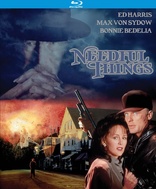
Movie rating
6.4 | / 10 |
Blu-ray rating
| Users | 2.5 | |
| Reviewer | 3.0 | |
| Overall | 2.9 |
Overview
Needful Things (1993)
Welcome to Castle Rock, Maine, a lovely place to live if you don't mind selling your soul! Sheriff Alan Pangborn has a devil of a problem: Suddenly all the residents of his sleepy little town are dying'to kill each other. But at least business is still booming, especially at a new antique store. The store's owner has something for everyone, and his prices are always reasonable: just one small favor oh, and, of course, eternal damnation!
Starring: Max von Sydow, Ed Harris, Bonnie Bedelia, Amanda Plummer, J.T. WalshDirector: Fraser C. Heston
| Horror | Uncertain |
| Supernatural | Uncertain |
| Thriller | Uncertain |
Specifications
Video
Video codec: MPEG-4 AVC
Video resolution: 1080p
Aspect ratio: 1.85:1
Original aspect ratio: 1.85:1
Audio
English: DTS-HD Master Audio 2.0 (48kHz, 16-bit)
Subtitles
English
Discs
25GB Blu-ray Disc
Single disc (1 BD)
Playback
Region A (C untested)
Review
Rating summary
| Movie | 3.5 | |
| Video | 2.5 | |
| Audio | 4.0 | |
| Extras | 3.0 | |
| Overall | 3.0 |
Needful Things Blu-ray Movie Review
The Devil's in the Details (and the Details Are Gone)
Reviewed by Michael Reuben June 21, 2015Although director Fraser C. Heston (son of Charlton) remembers it differently, his first feature film, Needful Things, was generally panned by critics, and I still don't understand why. Faithful in spirit to the Stephen King novel of the same name, but drastically reduced in scope and detail from the book's 700 pages by screenwriter W.D. Richter (Big Trouble in Little China), the film boasts a first-rate cast who approached King's tale of human corruptibility with utmost seriousness. Even in its most comical and absurd moments, of which there are many, the actors play their roles with conviction. Much of the film's horror derives not from its gruesome effects, which Heston dialed down in key scenes, because he thought the power of suggestion was more effective, but from the believability the cast brings to the nefarious activities onscreen. They make it easy to accept that, with the right inducement, otherwise decent people could easily be persuaded, bit by bit, to commit ghastly crimes. Like many Stephen King adaptations, Needful Things was produced by Castle Rock Entertainment (in association with New Line Cinema). Columbia Pictures handled the original theatrical and VHS releases, but the video rights eventually landed with MGM, who has now licensed them to Kino Lorber for its "studio classics" Blu-ray line.
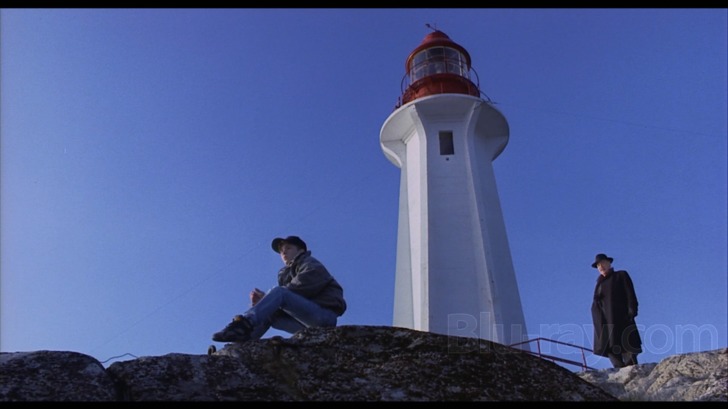
The setting is Stephen King's fictional town of Castle Rock, Maine, where everyone has known everyone forever, except for a relative newcomer, Sheriff Alan Pangborn (Ed Harris), who moved there from Pittsburgh, because he was tired of big city problems. (There is, of course, more to that story.) The sheriff has found love in the person of café owner Polly Chalmers (Bonnie Bedelia), but otherwise the move has been a disappointment. Expecting that Castle Rock would be a town where his biggest problem would be "getting some goddamn cat out of a tree", the sheriff has discovered that country life isn't the solution. Or, as Pangborn puts it: "Everybody is insane—everywhere!" Take, for example, head selectman Danforth Keeton (the great character actor, J.T. Walsh), who sells yachts for a living, can't resist betting on the horses, and bitterly resents that the townspeople call him "Buster" instead of treating him with the respect he thinks he deserves. Especially when he's been drinking, "Buster" suffers from the delusion that he's being watched by mysterious observers hiding behind mirrors, and his paranoia only increases as his gambling debts mount. He is prone to outbursts of temper against those he considers beneath him, such as Sheriff Pangborn's deputy, Norris Ridgewick (Ray McKinnon), who commits the unpardonable sin of ticketing "Buster's" automobile. The local Catholic priest, Father Meehan (William Morgan Sheppard), has an ongoing feud with his Baptist "competitor", Reverend Rose (Don S. Davis). The town drunk, Hugh Priest (Duncan Fraser), routinely provokes altercations with tavern owner Henry Beaufort (Eric Schneider). Ill-tempered turkey farmer Wilma Jerzyck (Valri Bromfield) curses anyone who crosses her path, but she bears particular ill will against shy Nettie Cobb (Amanda Plummer), an animal lover whose dog Wilma despises. Conflicts like these exist in every community, and they usually amount to nothing. But then a newcomer arrives in Castle Rock, one Leland Gaunt (Max von Sydow), a courtly shopkeeper with a foreign accent who says he's from Akron, Ohio. Gaunt opens a shop called "Needful Things", and he seems to have the heart's desire of whoever walks in the door. His prices are reasonable: just a minor amount of coin, plus an act of mischief that Gaunt always manages to make sound harmless and reasonable. Gaunt's provocations are designed to turn up the heat on long-simmering resentments. Within days, the formerly peaceful town erupts in incidents of bloody violence. Needful Things explores a single idea, but it does so with such gleeful variety that the notion never grows dull. True temptation is an intimate affair. It occurs at the point where a person is most "needful" and vulnerable. It may be something obvious like freedom from chronic pain or relief from desperate financial straits; or it may involve a subtler connection such as a link to a happier time in life when the world was full of hope and promise, or possibly some Holy Grail-like object that one never hoped to find (maybe even the Grail itself). Gaunt says that he offers his customers a "choice", but only in the sense that a heroin dealer offers choice to an addict. Once the customer is hooked on his or her "needful thing", they will do anything to retain it. Despite the many suggestions that Gaunt is the devil—"The young carpenter from Nazareth? I knew him well"—one need not take its religious references literally to accept the acuteness of the tale's psychological insight. Of course, the fact that a devil-like character is being played by the same actor who was Father Merrin in The Exorcist and Jesus in The Greatest Story Ever Told only adds layers of irony to Max von Sydow's portrayal of Gaunt, which the Swedish legend seems to have relished. According to the newly recorded commentary by director Heston, von Sydow was meticulous in working out even the smallest gesture of his performance. Perhaps that explains why he dominates every scene in which he appears, just as Gaunt overpowers everyone he encounters by the sheer force of his self-assurance. "I don't work that way!" Gaunt responds to someone who tells him to do his own dirty work. Why should he, when there's always someone willing to do it for him, if they can just have the one thing they so dearly want?
Needful Things Blu-ray Movie, Video Quality 
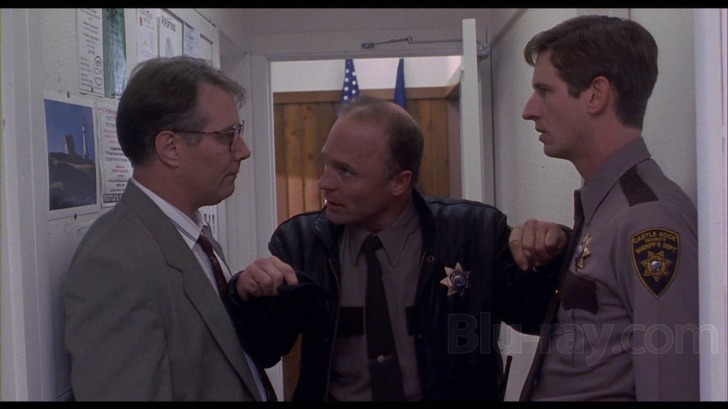
Needful Things was shot by Tony Westman, who would team again with director Fraser on the feature film Alaska, but whose principal work has been in television (he shot most of the Showtime series Dead Like Me). Perhaps because director Heston knew in advance that the editing would involve a complex interweaving of multiple threads, he and Westman seem to have opted for a visual style that is relatively low-key, with the exception of the "visions" that Gaunt's customers experience when each one first encounters his or her "needful thing". Kino's 1080p, AVC-encoded Blu-ray has been made from a well-preserved source, probably an IP, that is relatively clean, with only minor scratches, dust and other occasional blemishes. The colors, especially in the "vision" inserts, are strong. However, there are a number of issues, some of them serious. Black levels are inconsistent, with blacks sometimes slipping into dark gray, and overbrightening is frequently evident, which is especially a problem in a film with many shots where haze, smoke and/or fog are used to supply atmosphere. The image has been heavily filtered, resulting in a loss of fine detail. Even worse, the image is often flat and at times has the slightly "smeared" appearance that is the byproduct of aggressive grain reduction; the effect may not be obvious on screens under 50", but it becomes more pronounced as screen size increases. Moreover, the film's grain pattern is virtually invisible for large stretches of the running time. Even with the grain reduced, the image suffers from noticeable compression artifacts, no doubt as a result of Kino's decision to release a 121-minute film on a BD-25, resulting in an average bitrate of 20.94 Mbps. With a 1.85:1 film containing this much activity and complex imagery, that is simply insufficient, and shifting backgrounds can be readily observed in the quietest scenes, which the compressionist probably starved for bandwidth in order to preserve as much as possible for the action highlights. The effect is similar to what used to be called "posterization"; for an example (to the extent the flaw can be conveyed by a still image), look at the dark area over Gaunt's left shoulder in screencap 5.
Needful Things Blu-ray Movie, Audio Quality 
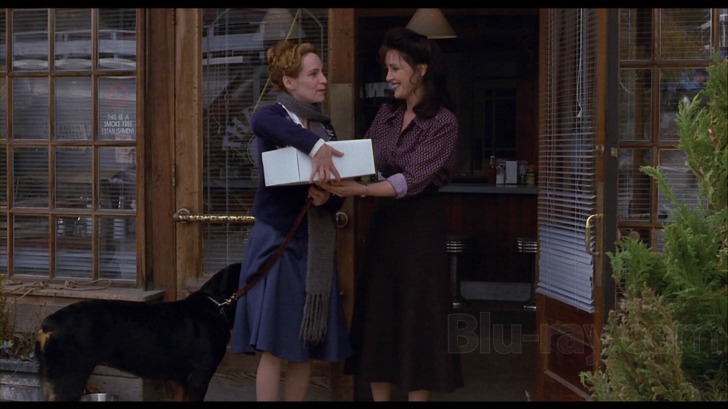
The film's original Dolby Stereo track has been encoded in lossless DTS-HD MA 2.0, and it is very effective when played back through a good surround decoder. Especially notable are the moments when each of Gaunt's victims comes in contact with his or her "needful thing" and experiences a powerful vision, usually of something deeply fulfilling that renders the victim powerless to resist the object's allure. At that moment, the sound field expands outward into the surrounds and envelops the listener, just as the experience envelops Gaunt's purchaser; you are momentarily transported inside the purchaser's head before being dropped abruptly back into the normal sonic landscape of Castle Rock. Other effects—shattering glass, screeching tires, colliding vehicles, gunshots and a few powerful explosions—are rendered with appropriate impact. Gaunt's Mercedes, which is heard only near the beginning and end, has a deeper rumble than one usually encounters from a single automobile engine in a film. Voices are clearly rendered, and the demonic thriller score by Patrick Doyle (Rise of the Planet of the Apes), with key assists from Grieg's Peer Gynt Suite and Schubert's Ave Maria, achieves the appropriate balance between horror and comedy.
Needful Things Blu-ray Movie, Special Features and Extras 
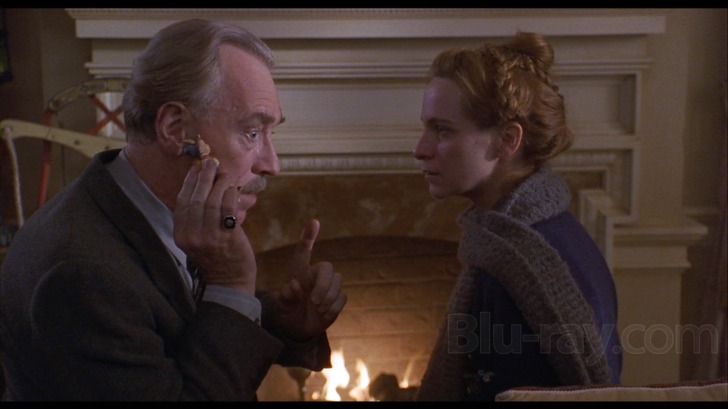
Needful Things was released on DVD by the now-defunct Polygram in 1998 and again by MGM in 2002. Both versions contained only a trailer. Kino has recorded a new commentary with the film's director, which makes this Blu-ray a must-own for any fan of the film.
- Commentary with Director Fraser C. Heston: Prompted by occasional questions from interviewer Walter Olsen of Scorpion Releasing, who also produces extras for Kino, Heston combines observations on the story itself with recollections of working with the actors, stories of shooting on location in Canada and detailed explanations of how various shots were accomplished (e.g., the extended sequence in which every window of an isolated farmhouse is broken, along with every breakable item inside). Since no other extras were created for previous editions, Heston's commentary is an invaluable resource.
- Trailer (480i; 1.85:1, enhanced; 2:01): Note that the trailer contains scenes not included in the theatrical cut.
Needful Things Blu-ray Movie, Overall Score and Recommendation 
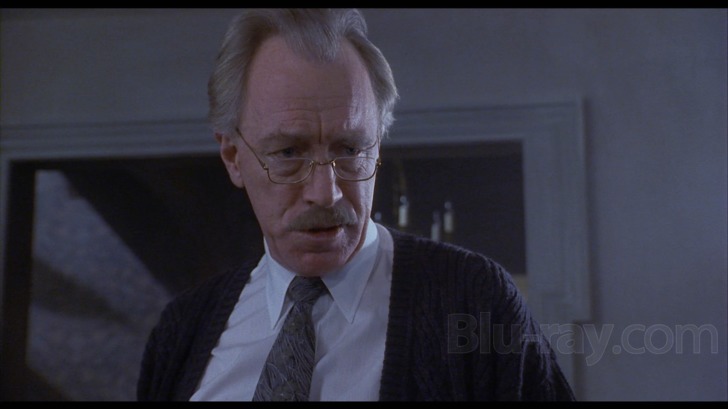
Needful Things may not rank in the first tier of Stephen King adaptations, which includes The Shawshank Redemption, Misery, De Palma's Carrie and The Shining (leaving aside the question of whether Kubrick's film is more Kubrick than King), but it is certainly one of the better second-tier films, even though Heston had to cut about twenty minutes from his preferred version, losing an entire subplot involving the mother of young Brian Rusk (Shane Meier) in the process. (Played by an uncredited Lisa Blount, she appears fleetingly in the theatrical release.) Kino's presentation is an upgrade from the DVD because of the new commentary. The video presentation is more problematic. Buyer's choice.
Other editions
Needful Things: Other Editions
Similar titles
Similar titles you might also like

Bloody Birthday
1981

The Crazies
2010

The Dead Zone 4K
Collector's Edition
1983

Halloween 4: The Return of Michael Myers 4K
Collector's Edition
1988

Deadly Blessing
Collector's Edition
1981

The Night Stalker
1972

Halloween 4K
Collector's Edition
1978

Sleepwalkers
Collector's Edition
1992

The Texas Chainsaw Massacre: The Beginning 4K
Limited Edition
2006

Halloween 4K
2018

Halloween Kills
Extended Cut
2021

Leatherface
2017

Pet Sematary Two
Collector's Edition
1992

The Last House on the Left
1972

Texas Chainsaw 3D
2013

Children of the Corn IV: The Gathering
1996

Incubus
1982

Red State
2011

I Spit on Your Grave
Unrated
2010

Candy Land
2022

